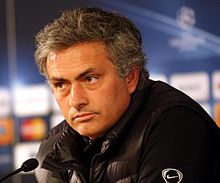José Mourinho
From Wikipedia, the free encyclopedia
This article is about the Portuguese football coach. For other people named Mourinho, see Mourinho (name).
 |
|||
| Personal information | |||
|---|---|---|---|
| Full name | José Mário dos Santos Mourinho Félix | ||
| Date of birth | 26 January 1963 | ||
| Place of birth | Setúbal, Portugal | ||
| Height | 1.74 m (5 ft 9 in)[1] | ||
| Playing position | Central midfielder | ||
| Club information | |||
| Current club | Real Madrid (manager) | ||
| Senior career* | |||
| Years | Team | Apps† | (Gls)† |
| 1980–1982 | Rio Ave | 16 | (2) |
| 1982–1983 | Belenenses | 16 | (2) |
| 1983–1985 | Sesimbra | 35 | (1) |
| 1985–1987 | Comércio e Indústria | 27 | (8) |
| Total | 94 | (13) | |
| Teams managed | |||
| 2000 | Benfica | ||
| 2001–2002 | União de Leiria | ||
| 2002–2004 | Porto | ||
| 2004–2007 | Chelsea | ||
| 2008–2010 | Internazionale | ||
| 2010– | Real Madrid | ||
| * Senior club appearances and goals counted for the domestic league only. † Appearances (Goals). |
|||
This name uses Portuguese naming customs. The first or maternal family name is Santos and the second or paternal family name is Mourinho Félix.
José Mário dos Santos Mourinho Félix, OIH, or simply José Mourinho (Portuguese pronunciation: [ʒuˈzɛ moˈɾiɲu]; born 26 January 1963), is a Portuguese football manager, currently the head coach of Real Madrid. He is commonly known as "The Special One".[2] Mourinho is regarded by some players, coaches, and critics as one of the best football coaches of all time.[3][4][5][6][7][8] Mourinho started out as a player and eventually switched to management. After working as a physical education
teacher and spells working as a youth team coach, a scout, and an
assistant manager in the early 1990s, he became an interpreter for Sir Bobby Robson. He worked with Robson at Sporting Lisbon and Porto in Portugal, and Barcelona in Spain. He remained at the Catalonian club after Robson's departure and worked with his successor Louis van Gaal.He began focusing on coaching and impressed with brief but successful managerial periods at Benfica and União de Leiria, taking the latter to their highest ever league finish. He returned to Porto in early 2002 as head coach, winning the Primeira Liga, Taça de Portugal, and UEFA Cup in 2003. In the next season Mourinho guided the team to victory in the Supertaça Cândido de Oliveira, to the top of the league for a second time, and won the highest honour in European club football, the UEFA Champions League. Mourinho moved to Chelsea the following year and won the Premier League title, the club's first league title in 50 years, and the League Cup in his first season. In his second year Chelsea retained the Premier League and in 2006–07 he took the club to an FA Cup and League Cup double, though they finished as league runners-up. He often courted controversy for his outspokenness, but his victories at Chelsea and Porto established him as one of the world's top football managers. Mourinho left Chelsea in September 2007, amidst reports of a rift with club owner Roman Abramovich.[9]
In 2008 Mourinho signed a three-year contract with Serie A club Internazionale. Within three months he had won his first Italian honour, the Supercoppa Italiana, and completed the season by winning the Serie A title. In 2009–10 Inter became the first Italian club to win the treble of Serie A, Coppa Italia and the UEFA Champions League, the first time Inter had won the latter competition since 1965. In doing so, Mourinho became the third manager in football history to win the UEFA Champions League with two different teams, after Ernst Happel and Ottmar Hitzfeld.[10] He won the first ever FIFA Ballon d'Or Best Coach Award in 2010. He then signed with Real Madrid in 2010, winning the Copa del Rey in his first season. The following year he won the La Liga and became the fourth coach, after Tomislav Ivić, Ernst Happel, and Giovanni Trapattoni, to have won league titles in at least four different countries: Portugal, England, Italy, and Spain,[11] also becoming the first manager to win the traditional top three European league championships.[12]


0 Response to "José Mourinho di depak"
Posting Komentar